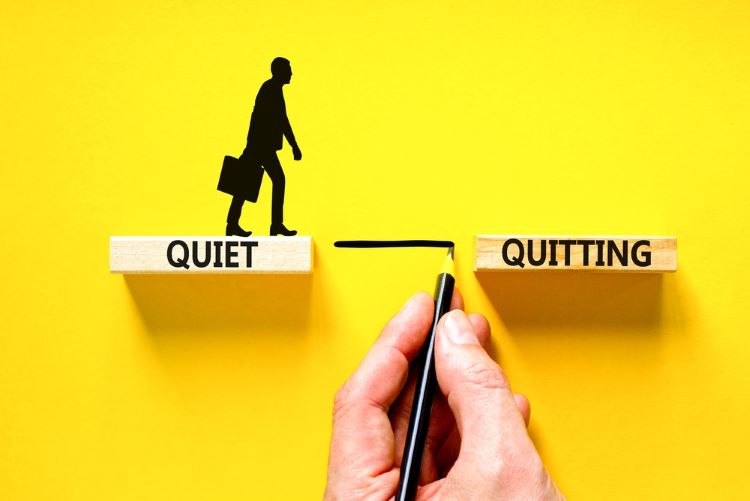If recession comes, how will law firm 'quiet quitters' fare?

Image from Shutterstock.
David Wang, an attorney and chief innovation officer at Wilson Sonsini Goodrich & Rosati, has some advice for workers who are “quiet quitting”—the viral term for people who haven’t actually left their jobs but mentally have checked out and are doing only the bare minimum.
“You should actively address what you want out of your career. Coasting doesn’t seem to be the solution,” says Wang, who wrote a mostly well-received post on LinkedIn about the phenomenon in September. “I have a personal aversion to that attitude.”
First, there was the “Great Resignation” or the “Great Reshuffle,” and now “quiet quitting” is part of the workplace zeitgeist too. But the buzzword emerged at a time of high economic anxiety, signs of shrinking productivity in the legal profession and a cooling job market.
In late November, American international firm Cooley LLP sounded the alarm when it laid off 150 of its staff, including 78 lawyers. That followed a sobering report published by the Thomson Reuters Institute’s Law Firm Financial Index suggesting while the legal industry remains strong there could be tougher times ahead. It found a decline in profit per lawyer for the third consecutive quarter, and demand declined by 0.7% compared with the same period last year.
William Josten, a senior manager at the Thomson Reuters Institute, says the legal profession tends to lag behind other industries when there is a recession. But in an economic downturn, will law firm leaders take a closer look at “quiet quitting” lawyers?
Kent Zimmermann, a strategic adviser to law firm leaders and a principal at the Zeughauser Group, believes they will. He says some are interested in using an uncertain economy “as cover” to let some lawyers go.
“They’ve already started the effort to get ready for a potential recession by identifying lawyers who for years have been disengaged and underperforming the firm’s expectations,” Zimmermann says.
Even though law firms revolve around billable hours, neither Zimmermann nor Wang has much doubt that quiet quitting lawyers are a thing. It is less likely to be tolerated at the highest performing firms, according to Zimmerman.
“Sometimes chairs and managing partners privately joke that [some] partners have retired but haven’t left the firm yet. They keep drawing a salary and don’t seem to be working too hard,” Zimmerman says.
“It happens in every profession,” Wang says. “My mom used to say, ‘If you’re the best at your job, you’re never going to be worried about your job.’ The converse is true. If you’re the worst at your job, you’re always going to be the first one to be let go.”
But attorney and career expert Wendi Weiner says quiet quitting is also a reaction to burnout and is about setting boundaries. By her definition, it could apply to lawyers who are planning to eschew high-stress jobs in big law firms for other types of law practice, or maybe transitioning to another career altogether. Other attorneys might have decided they are no longer going to work on weekends, she says.
“It’s a bigger signal that the legal profession is dealing with large amounts of workplace burnout,” she says. “It’s more about refocusing and creating boundaries.”
A yearning for work-life balance was top of mind for many of the lawyers who left their jobs in the 12 months prior to April 2022, according to this year’s Clio Legal Trends Report. It found that lawyers rated work-life balance as highly as pay when switching jobs.
Michael Kasdan, a New York City-based intellectual property lawyer with the law firm Wiggin and Dana, is an advocate for mental health and wellness in the legal profession. He agrees burnout is one reason why quiet quitting is resonating.
“It doesn’t take a big stretch to say if you’re feeling burned out you’re going to try and protect yourself and your mental health,” Kasdan says, adding that quiet quitters also could include those who are coasting because they are dissatisfied at their firms and ready to move on.
“Though it’s not new, we’re seeing it through a different lens,” he adds.
Benjamin Granger, PhD, a chief workplace psychologist at the experience management company Qualtrics, says it would be a “huge mistake” for organizations to use their newfound bargaining power to scale back their attention on work-life balance and burnout.
“The notion of who’s in the power position now—the company or the talent—I don’t think that’s productive,” Granger says. “This is an opportunity to find that balance where both parties can win. [It’s not about] escalating and leveraging the power, because it’s going to come back to bite you.”
Even if law firms decide to target attorneys who are coasting, they have options besides firing them. Weiner says firms could ask for more billable hours, insist they do more professional development or place them on a performance-improvement plan.
And Josten adds that lawyers doing the bare minimum are probably looking for something else because they “aren’t particularly happy with their firm.”
That’s where law firm culture comes in. Josten says talent recruitment and retention has been top of mind for law firm leaders for the past year. He points to a Thomas Reuters Institute report, “Law Firms Competing for Talent in 2022,” which found lawyers value places where they “feel heard and comfortable” and can “work with a desirable degree of flexibility and autonomy,” according to Josten.
“As turnover trends change, those characteristics are going to remain relatively stable,” he says.
Wang agrees working at big law firms is intense, with long hours and little time for vacations. But he says quiet quitting is not the answer.
“You want to change the system? Going home at 5 p.m. is not going to do it.”



